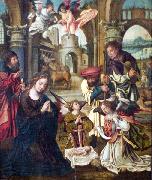La Peinture à l'huile en gros de Chine & Encadre |
|||||||||||

|
|||||||||||
|
|
|
|||||||||||||||
|
Pieter Coecke van Aelst
(August 14, 1502 - December 6, 1550) was a Flemish painter. He studied under Bernaert van Orley and later lived in Italy before entering the Antwerp Guild of painters in 1527. In 1533, he travelled to Constantinople for one year in a failed attempt to establish business connections for his tapestry works. Van Aelst established a studio in Brussels in 1544, where he created paintings and tapestries. His students include Gillis van Coninxloo, Willem Key, Hans Vredeman de Vries, Michiel Coxcie, and possibly Pieter Brueghel the Elder, who did eventually marry van Aelst's daughter, Mayken. His second wife, Mayken Verhulst, was an artist as well, and, according to Carel van Mander, the first teacher of her grandchildren, Pieter Brueghel the Younger and Jan Brueghel the Elder. He was also the uncle of Joachim Bueckelaer. Van Aelst's studio is also well known for its engraved works. In particular, van Aelst is noted for his 1539 translation of Sebastiano Serlio's architectural treatise, Architettura, which is credited with having played a crucial role in spreading Renaissance ideas to the Low Countries and hastening the transition from the late Gothic style prevalent in the area at the time. He was in charge of the spectacular decorations for the 1549 Royal entry into Antwerp of Philip II of Spain, "the most famous entry of the century", according to Roy Strong. |
|
||||||||||||||
|
|
|||||||||||||||
|
|||||||||||||||
|
|
|||||||||||||||
| Pieter Coecke van Aelst
(August 14, 1502 - December 6, 1550) was a Flemish painter. He studied under Bernaert van Orley and later lived in Italy before entering the Antwerp Guild of painters in 1527. In 1533, he travelled to Constantinople for one year in a failed attempt to establish business connections for his tapestry works. Van Aelst established a studio in Brussels in 1544, where he created paintings and tapestries. His students include Gillis van Coninxloo, Willem Key, Hans Vredeman de Vries, Michiel Coxcie, and possibly Pieter Brueghel the Elder, who did eventually marry van Aelst's daughter, Mayken. His second wife, Mayken Verhulst, was an artist as well, and, according to Carel van Mander, the first teacher of her grandchildren, Pieter Brueghel the Younger and Jan Brueghel the Elder. He was also the uncle of Joachim Bueckelaer. Van Aelst's studio is also well known for its engraved works. In particular, van Aelst is noted for his 1539 translation of Sebastiano Serlio's architectural treatise, Architettura, which is credited with having played a crucial role in spreading Renaissance ideas to the Low Countries and hastening the transition from the late Gothic style prevalent in the area at the time. He was in charge of the spectacular decorations for the 1549 Royal entry into Antwerp of Philip II of Spain, "the most famous entry of the century", according to Roy Strong. Adoration_by_the_Shepherds. Date 1540s Medium Oil on panel cjr Date 1540s Medium Oil on panel cjr |
|||||||||||||||
|
Related Paintings to Pieter Coecke van Aelst :. |
|||||||||||||||
|
|
|||||||||||||||
|
|
|||||||||||||||
|
CONTACTER DES Etats-Unis |







